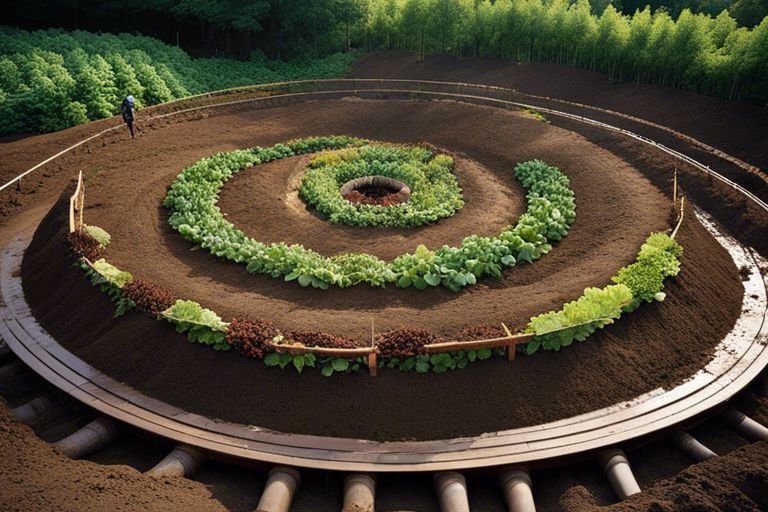Permaculture, a system of agricultural and social design principles centered around simulating or directly utilizing the patterns and features observed in natural ecosystems, places a great emphasis on understanding the flow of energy and resources in a sustainable way. Organic waste is a crucial part of this cycle, as it plays a significant role in replenishing the soil and nourishing plant life. In this guide, I will break down what is considered organic waste, the importance of properly managing it, and how it ultimately contributes to the circle of life.
Key Takeaways:
- Organic waste includes food scraps, yard trimmings, paper products, and other biodegradable materials.
- Composting is a key component of the circle of life, as it turns organic waste into nutrient-rich soil for new plant growth.
- Reducing food waste is an important step in minimizing organic waste and its environmental impact.
- Understanding the circle of life helps individuals see the interconnectedness of all living things and the importance of sustainable waste management practices.
- Proper disposal and recycling of organic waste can help reduce methane emissions and contribute to a healthier environment.
What Is Organic Waste
The term “organic waste” refers to any material that is biodegradable and comes from either a plant or animal source. This type of waste is made up of natural materials that are capable of decomposing over time. This decomposition process forms an essential part of the natural cycle of life and is responsible for recycling vital nutrients back into the environment.
Definition of Organic Waste
Organic waste is a broad category that encompasses a wide range of materials, including food scraps, yard trimmings, paper products, and even biodegradable plastics. Essentially, any material that comes from a living organism and can decompose is considered organic waste. This type of waste can be broken down by microorganisms such as bacteria and fungi, which play a crucial role in the natural decomposition process.
Types of Organic Waste
There are several types of organic waste that can be found in various settings. Common examples include:
- Food Waste: This includes leftover food, food scraps, and spoiled food products.
- Yard Waste: Grass clippings, leaves, branches, and other organic materials from gardening and landscaping activities.
- Wood Waste: Sawdust, wood shavings, and wood scraps from construction and woodworking projects.
- Paper Waste: Used paper products, cardboard, and other paper-based materials.
- Animal Waste: Manure, feathers, and other by-products from livestock and poultry.
Perceiving the different types of organic waste is essential for understanding how to manage and properly dispose of them. It’s important to note that while organic waste is biodegradable and beneficial for the environment, improper disposal can lead to various environmental and health hazards.
Understanding the Circle of Life
Clearly, understanding the circle of life is essential to comprehend the role of organic waste in the environment. The circle of life refers to the interconnectedness of all living organisms and their relationship with the environment. Every organism, including humans, contribute to this cycle by producing, consuming, and ultimately decaying, creating organic waste that is vital for sustaining life on Earth. This intricate web of life is a delicate balance that relies on the efficient breakdown and recycling of organic matter.
The Process of Decomposition
The process of decomposition is a fundamental part of the circle of life, as it is the mechanism through which organic waste is broken down and recycled. When organic matter such as leaves, food scraps, and dead organisms decompose, they are broken down by a variety of microorganisms such as bacteria, fungi, and insects. This breakdown releases essential nutrients back into the soil, enriching it and enabling the growth of new plants. However, the decomposition process can also release harmful greenhouse gases such as methane, contributing to climate change if not managed properly.
The Importance of Organic Waste in Ecosystems
Organic waste plays a crucial role in ecosystems by providing the nutrients necessary for the growth of plants and the sustenance of all living organisms. When organic matter decomposes, it enriches the soil, allowing plants to absorb essential nutrients and thrive. This, in turn, supports a diverse array of animals and microorganisms that rely on these plants for food and shelter. Furthermore, organic waste provides a sustainable source of energy and serves as a natural fertilizer, reducing the need for synthetic chemicals and promoting a healthier, more balanced ecosystem.
Managing Organic Waste
Not managing organic waste properly can lead to environmental problems such as pollution and greenhouse gas emissions. It is important to understand the proper ways to handle and dispose of organic waste to minimize its negative impacts on the environment. The management of organic waste includes proper disposal, composting, and recycling.
Tips for Proper Organic Waste Management
When it comes to managing organic waste, there are several tips that can help you do so effectively. Firstly, separate your organic waste from other types of waste to make it easier for recycling and composting. Additionally, reduce the amount of organic waste you produce by composting at home. Reuse organic waste by turning it into compost for your garden instead of throwing it away. Finally, recycle organic waste to prevent it from ending up in landfills.
- Separate your organic waste from other types of waste
- Reduce the amount of organic waste you produce
- Reuse organic waste by turning it into compost
- Recycle organic waste to prevent it from ending up in landfills
Any organic waste that cannot be composted or recycled should be disposed of properly to minimize its impact on the environment.
Step-by-Step Guide to Composting
Composting is an effective way to manage organic waste and create valuable fertilizer for your garden. Here’s a step-by-step guide to composting:
| Step 1: | Start by selecting a location for your compost pile or bin. Choose a shaded area with good drainage. |
| Step 2: | Collect organic waste such as fruit and vegetable scraps, yard trimmings, and coffee grounds. Avoid adding meat, dairy, or oily foods to your compost pile. |
| Step 3: | Layer the organic waste with brown materials such as leaves, straw, or shredded newspaper to create a balanced compost pile. |
| Step 4: | Keep the compost pile moist and aerated by turning it regularly and adding water as needed. |
| Step 5: | Wait for the organic waste to decompose and turn into dark, crumbly compost that can be used in your garden. |
Composting not only reduces the amount of organic waste that ends up in landfills, but it also provides a valuable resource for enriching your soil and promoting healthy plant growth.
Factors Influencing Organic Waste
For organic waste to be properly managed, it is important to understand the factors that influence its generation and disposal. These factors include:
- Population density: Areas with higher population density tend to produce more organic waste due to increased human activities.
- Socio-economic status: The income levels and consumption patterns of individuals within a society can impact the amount of organic waste generated.
- Industrialization and urbanization: Rapid industrial growth and urban development lead to increased organic waste production, particularly from industrial and domestic sources.
This understanding of the factors contributing to organic waste generation is crucial in developing effective waste management strategies.
Environmental Impact of Organic Waste
The disposal of organic waste can have significant environmental implications. When organic waste is sent to landfills, it decomposes and produces methane, a potent greenhouse gas that contributes to climate change. Additionally, the leachate from decomposing organic waste can pollute soil and water, posing a threat to ecosystems and human health. Proper management of organic waste is essential to mitigate these environmental impacts.
Economic and Social Factors
When considering organic waste, economic and social factors play a crucial role in its management. Lower-income communities may lack access to proper waste management infrastructure, leading to uncontrolled dumping and environmental degradation. Additionally, the cost of implementing effective organic waste management systems can be a barrier for some communities. Assume that investing in sustainable waste management practices can lead to long-term cost savings and positive social impact.
Pros and Cons of Organic Waste Management
Now, let’s take a closer look at the pros and cons of organic waste management. Understanding these advantages and disadvantages is crucial in developing effective waste management strategies that are environmentally friendly and sustainable.
| Pros | Cons |
| Reduced greenhouse gas emissions | Odor and pest issues |
| Production of valuable compost | Cost of equipment and maintenance |
| Conservation of natural resources | Challenges in scaling up for large-scale operations |
| Supports sustainable agriculture | Lack of widespread infrastructure for organic waste management |
| Opportunities for renewable energy production | Contamination of soil and water if not managed properly |
Benefits of Proper Organic Waste Disposal
Proper organic waste disposal plays a crucial role in reducing greenhouse gas emissions and supporting sustainable agriculture. When organic waste is managed effectively, it can be turned into valuable compost that enriches soil and reduces the need for chemical fertilizers. Additionally, it offers opportunities for renewable energy production, contributing to a more sustainable and environmentally friendly energy mix.
Drawbacks of Improper Organic Waste Disposal
Improper organic waste disposal can lead to a range of environmental and public health issues. From contamination of soil and water to odor and pest problems, the consequences of inadequate waste management can be significant. Additionally, the lack of widespread infrastructure for organic waste management presents challenges in dealing with large volumes of waste, leading to potential environmental degradation.

What Is Considered Organic Waste – Understanding the Circle of Life
With this in mind, it is important to properly understand what is considered organic waste in order to grasp the full scope of the circle of life. Organic waste includes any material that is biodegradable and comes from a living organism, such as food scraps, yard trimmings, and paper products. By recognizing and properly disposing of organic waste, we can not only reduce the amount of waste that ends up in landfills, but also contribute to the natural cycle of nutrients and energy in the environment. Understanding the importance of organic waste in the circle of life can help us make more environmentally conscious decisions and work towards a more sustainable future.
FAQ
Q: What is considered organic waste?
A: Organic waste is any waste that is biodegradable, such as food scraps, yard trimmings, and paper products. This type of waste can be broken down by microorganisms and turned into compost or used for energy production.
Q: Why is it important to understand the circle of life in relation to organic waste?
A: Understanding the circle of life in relation to organic waste is crucial because it allows us to see how organic materials can be reused and repurposed in a sustainable way. This helps reduce the amount of waste going to landfills and minimizes the environmental impact of our consumption habits.
Q: How can organic waste be managed effectively?
A: Organic waste can be managed effectively through composting, anaerobic digestion, and recycling. These processes allow organic waste to be transformed into valuable resources such as fertilizer, biogas, and renewable energy.
Q: What are the environmental benefits of properly managing organic waste?
A: Properly managing organic waste helps reduce greenhouse gas emissions, minimizes soil and water contamination, and conserves natural resources. By diverting organic waste from landfills, we can also reduce the production of harmful methane gas, which contributes to climate change.
Q: How can individuals contribute to the sustainable management of organic waste?
A: Individuals can contribute to the sustainable management of organic waste by practicing waste reduction, separating organic waste from other types of waste, and supporting local composting programs. By being mindful of our consumption and disposal habits, we can all play a role in minimizing the environmental impact of organic waste.




